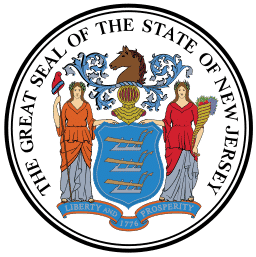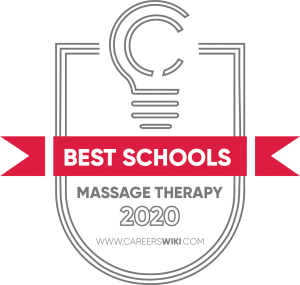…
There are 10 massage therapy schools in New Jersey, including private institutes and public colleges.
Certificate programs take a year or less to complete. One school offers a two-year associate degree. Every curriculum is composed of lectures in classrooms, instruction in labs, and experience in clinics. The instruction and training qualify graduates to apply for licensure.
Employment opportunities abound in the Garden State, where earnings for most massage therapists exceed the national average. Authorities project there will be about 820 job openings every year until 2026.
View the list of our top massage schools by clicking here.

This government office, part of the New Jersey Division of Consumer Affairs. regulates the practice of massage. Its purpose is to “protect the health, safety, and welfare” of state residents.
The board establishes licensure requirements for massage therapists concerning education, training, and examinations. It issues licenses to applicants who qualify, ensures that practitioners renew their licenses, and investigates and prosecutes allegations of illegal and unethical behavior.
The board also licenses the owners of massage businesses, and sets standards for MT school curricula. A list of approved educational programs is posted online.
There are eight board members, five of whom must be licensed massage therapists. Two come from state executive departments, and one represents the public.
To become a massage therapist in New Jersey, the first prerequisite is either a high school degree or a GED. College-level classes in health and science are recommended.
A student needs to enroll at a postsecondary school that has earned state board approval. The institution must be authorized by the state Education Department, Labor and Workforce Development Department, or the Commission on Higher Education.
Board-approved MT programs provide 500 or more clock hours of education.
This must include:
One semester credit equals 15 hours.
The remainder of the curriculum varies. Some programs feature instruction in a wider range of massage modalities and related therapies. Others require general education courses or business classes.
A graduate needs to apply to the state board for licensure to practice massage therapy in the state. This entails passing the computer-based Massage & Bodywork Licensing Examination (MBLEx). The Federation of State Massage Therapy Boards assesses a fee of about $200 to register for the test at a center operated by Pearson VUE.
Another license requirement is to be certified in CPR, first aid, and the use of a defibrillator.
MTs have to renew their licenses every other year. Each time, they must receive 20 hours of continuing education from approved providers.
We selected the schools below based on the programs that they offer, accreditation, student population, graduation rate and reputation.
View our Ranking Methodology to learn more about how we rank schools.

NA
35
A private school in East Brunswick, AIAM focuses exclusively on training massage therapists. The curriculum covers clinical massage and spa therapies.
The program exceeds state requirements. Courses include Active Isolated Stretching, Myofascial Release, Neuromuscular Therapy, Orthopedic Assessment, Reflexology, and Functional Integrated Therapy. Students learn Swedish, chair, hot stone, prenatal, and sports massage methods. They spend 200 hours giving massages to the public in a student clinic.
The school maintains a list of employment opportunities. It teaches students interviewing techniques and schedules interviews with area businesses.
NA
200
This is a privately owned school in Franklin Township, which traces its history to 1924.
The massage therapy certificate program totals 750 clock hours in as little as eight months. Day and evening, as well as full- and part-time options are available. Students learn Swedish, sports, therapeutic, deep tissue, and pregnancy massage techniques. Other classes teach Shiatsu, acupressure, reflexology, trigger point therapy, hydrotherapy, energy bodywork, and spa techniques. Students get practical experience in an on-campus clinic.
Classes start six times per year. The school provides job-placement assistance for its students and graduates.
75%
28
This privately owned network of massage therapy and skin care schools operates a campus in Wall Township. Its certificate program has earned recognition by the prestigious Commission on Massage Therapy Accreditation.
The curriculum involves 600 clock hours, with takes 32 weeks full time or 47 weeks part time to complete. Courses cover a “spectrum of therapeutic methods.” Day and evening class schedules are available.
Students are automatically members of the national Associated Bodywork & Massage Professionals, which provides liability insurance. All faculty members are practicing specialists. The program provides hands-on training in a student clinic and during internships.
81%
43
Located in Voorhees, near Philadelphia, this is an Aveda “concept school.” The curriculum “includes rituals exclusive to (the company).”
The part-time massage therapy program, which stresses “holistic wellness,” covers spa treatments and medical approaches. Students learn Eastern and Western techniques such as pregnancy massage, aromatherapy, and Reiki. There is a student clinic on campus that serves the public.
The school provides continuing education courses in sports massage and neuromuscular therapy.
92%
77
This school has campuses in Bloomfield, Haskell/Pompton, and Tinton Falls. It is recognized by the Commission on Massage Therapy Accreditation.
The massage and bodywork certificate program teaches Swedish massage, Swedish massage for cancer survivors, medical massage, foot reflexology, chair and event sports massage, Asian-Oriental bodywork, pregnancy massage, Reiki, and aromatherapy. Day and evening class schedules are available. Students spend 146 hours in an on-campus clinic, administering Swedish massages to real clients.
There are also programs in massage therapy and personal training, Eastern-Western massage, and oncology massage. ITM offers 35 continuing education classes.
42%
191
A chain of private schools in four Eastern states with programs in seven health and medical fields, HSB awards massage therapy certificates on campuses in Cherry Hill and Linwood.
The 750-clock-hour curriculum involves fewer than seven months of day classes or just over a year of evening classes. Another option is a part-time evening schedule. In addition to the state-required subjects, courses cover myology, special populations, seated massage, hydrotherapy, lymphatic and blood circulation, reflexology, Asian theory, prenatal massage, Ayurveda, and polarity.
The school’s Career Services Department assists students in resume writing, job searching, interview preparation, and networking skills.
68%
539
This school, about 15 miles from midtown Manhattan, is part of the five-state Fortis system. It has a wide range of career programs, including a certificate in massage therapy.
The full-time, 750-clock-hour curriculum entails 30 weeks of day classes Monday through Friday, or 42 weeks of evening classes Monday through Thursday. Students learn Swedish and deep tissue massage, trigger point therapy, sports massage, spa therapies, and orthopedic massage. Classes begin every month.
Tuition includes licensing fees and a massage table. The school has a student clinic, career services, and continuing education classes.
12%
7514
This public community college in Newark awards an academic certificate in massage therapy.
The three-semester program satisfies state requirements, with additional courses in College Composition, Self-Care for the Massage Therapist, and Professional Development. Students learn Swedish massage, myofascial release, neuromuscular therapy, trigger point therapy, reflexology, and sports massage. The curriculum includes two practicums.
Incoming students take a placement test that determines whether they need developmental courses in reading, English, or math. Prerequisite classes are Written & Oral Communication and Scientific Knowledge & Reasoning. Having had a massage session with a professional therapist is “strongly recommended.”
19%
9675
This school boasts the lowest tuition of any postsecondary institution in New Jersey. CCC has two massage therapy programs: a certificate of achievement and an associate in applied science degree.
The 504-clock-hour, 35-credit certificate curriculum lasts two semesters, with student clinic assignments in the summer. The 66-credit AAS consists of four semesters plus summer clinics.
Among the AAS courses are English Composition, Environmental Management, Nutrition, Specialized Massage Techniques, Basic Psychology, Stress Management, Integrated Myofascial Structural Techniques, Public Speaking, Therapeutic Sensory Applications, Eastern Therapeutic Concepts, and Herbal Applications. Also required are elective classes in mathematics, health and exercise science, and humanities.
$21
$42,500
32%
According to the U.S. Bureau of Labor Statistics (BLS), the average New Jersey practitioner makes an annual salary of about $42,500 or an hourly wage of nearly $20.50. That is a bit better than the national median of around $41,400 a year or $20 per hour.
Income for the state’s top 10 percent is about $66,000 or almost $32, less than the nationwide rate of around $78,300 or $37.60. The bottom 10 percent, receive about $25,600 or $12.30 in New Jersey; and more than $21,300 or around $10.25 nationally.
The BLS reported that 5,480 licensed massage therapists were practicing in this state in 2016. The agency predicts the employment figure will gradually climb to 7,250 in 2026. That would be an impressive expansion rate of 32 percent, faster than the projected national average of 26 percent.
Sources: U.S. Bureau of Labor Statistics, CareerOneStop

LIMITED TIME DEAL